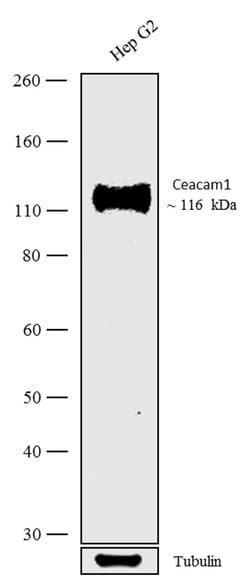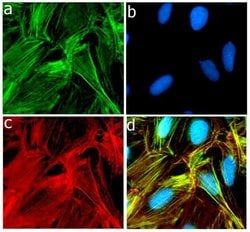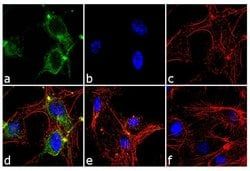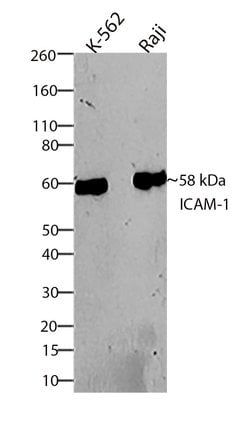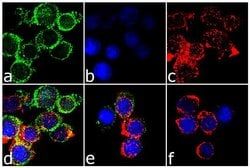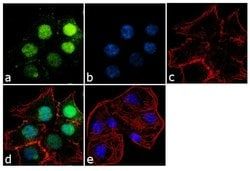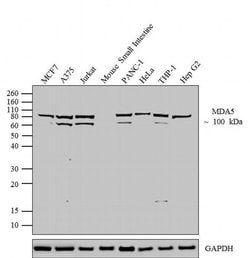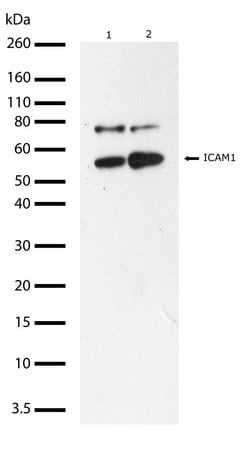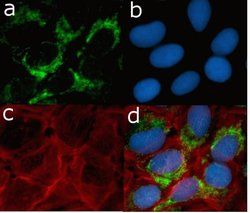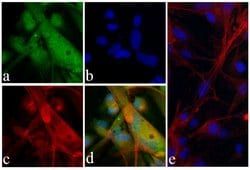CD44 Recombinant Rabbit Monoclonal Antibody (19H8L4), Invitrogen™
Manufacturer: Thermo Scientific
Select a Size
| Pack Size | SKU | Availability | Price |
|---|---|---|---|
| Each of 1 | PI701406-Each-of-1 | In Stock | ₹ 50,819.00 |
PI701406 - Each of 1
In Stock
Quantity
1
Base Price: ₹ 50,819.00
GST (18%): ₹ 9,147.42
Total Price: ₹ 59,966.42
Antigen
CD44
Classification
Recombinant Monoclonal
Concentration
0.5 mg/mL
Formulation
PBS with 0.09% sodium azide
Gene Accession No.
P15379, P16070
Gene Symbols
CD44
Immunogen
Peptide corresponding to amino acids 411-424 of human CD44.
Quantity
100 μg
Primary or Secondary
Primary
Target Species
Human, Mouse
Product Type
Antibody
Isotype
IgG
Applications
Immunocytochemistry
Clone
19H8L4
Conjugate
Unconjugated
Gene
CD44
Gene Alias
AU023126; AW121933; AW146109; Bovine CD44; CD44; CD44 antigen; CD44 antigen-like protein; CD44 molecule; CD44 molecule (Indian blood group); CD44 protein; CD44 variant; CD44A; CD44-like protein; CDW44; cell surface glycoprotein CD44; Cell surface glycoprotein CD44 (hyaluronate binding protein); cell-surface glycoprotein; chondroitin sulfate proteoglycan 8; CSPG8; ECMRIII; ECMR-III; Epican; extracellular matrix receptor III; extracellular matrix receptor-III; GP90 lymphocyte homing/adhesion receptor; HCELL; hematopoietic cell E- and L-selectin ligand; heparan sulfate proteoglycan; HERMES; Hermes antigen; homing function and Indian blood group system; HUTCH-I; hyaluronan receptor; Hyaluronate receptor; IN; LHR; Ly-24; lymphocyte antigen 24; lymphocyte surface antigen precursor CD44; MC56; MDU2; MDU3; METAA; MIC4; PGP I; Pgp1; PGP-1; PGPI; PGP-I; Phagocytic glycoprotein 1; phagocytic glycoprotein I; putative Bos taurus CD44; RHAMM; sCD 44; sCD44; soluble CD 44; soluble CD44
Host Species
Rabbit
Purification Method
Protein A
Regulatory Status
RUO
Gene ID (Entrez)
12505, 960
Content And Storage
Store at 4°C short term. For long term storage, store at -20°C, avoiding freeze/thaw cycles.
Form
Liquid
Related Products
Description
- This antibody is predicted to react with mouse based on sequence homology
- Intact IgG appears on a non-reducing gel as ∽150 kDa band and upon reduction generating a ∽25 kDa light chain band and a ∽50 kDa heavy chain
- Recombinant rabbit monoclonal antibodies are produced using in vitro expression systems
- The expression systems are developed by cloning in the specific antibody DNA sequences from immunoreactive rabbits
- Then, individual clones are screened to select the best candidates for production
- The advantages of using recombinant rabbit monoclonal antibodies include: better specificity and sensitivity, lot-to-lot consistency, animal origin-free formulations, and broader immunoreactivity to diverse targets due to larger rabbit immune repertoire
- CD44 cell surface antigen is a 100 kDa type 1 transmembrane glycoprotein widely expressed on human leucocytes, white matter of the brain and by some epithelial cells of the intestine and breast
- Several isoforms of CD44 exist, including the predominant CD44H isoform detected in many normal tissues
- CD44 is a receptor for hyaluronic acid (HA) and is involved in cell-cell interactions, cell adhesion and migration
- CD44 also participates in a wide variety of cellular functions including lymphocyte activation, recirculation and homing
- CD44 expression may be up-regulated upon some carcinomas, and it has been speculated that this may be related to metastatic potential
- CD44 is expressed by hematopoietic, non-hematopoietic cells, epithelial tissues, and to filopodia in cultured keratinocytes
- Further, bone marrow myeloid cells and memory T cells express CD44 at high levels, and peripheral B and T cells can upregulate the expression of CD44 in response to certain stimulatory events
- Transcripts for the CD44 gene undergo complex alternative splicing that results in many functionally distinct isoforms, however, the full-length nature of some of these variants have not been determined
- Alternative splicing is the basis for the structural and functional diversity of the CD44 protein
- Diseases associated with CD44 dysfunction include superficial keratitis and lichen sclerosus
- CD44 also may be related to tumor metastasis formation.
